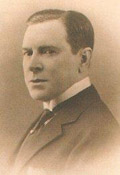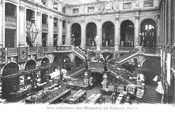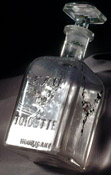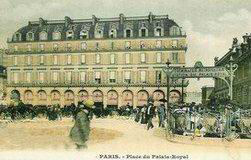Lightyears Collection
François Coty: Perfumer
The Early Years: 1874-1904
François Coty was not a child prodigy. François Coty was not an overnight success. Yet from the moment in 1904 of his great perfume marketing breakthrough — as a 29 year old married man — his rise to extraordinary wealth came "overnight" — thanks to his business insights, hard work, and amazing tenacity. Coty wanted success on a level the world has rarely seen — and he achieved it. But the first twenty-nine years of his life were sprinkled with frustration and only modest success. At the age of 29, there was nothing yet in Coty's curriculum vitae that would suggest he was about to become — by his own efforts — one of the richest men on the planet. Birth, Childhood, SchoolFrançois Coty was born "Joseph Marie François Spoturno", in Ajaccio, Corsica, on May 3, 1874 to Marie and Jean-Baptiste Spoturno. His mother's maiden name was "Coti" — with an "i". Coty's parents appear to have been respectable, middle-class people of no particular wealth or distinction. Later in life, Coty established a family relationship to Napoleon Bonaparte and discovered a relative who had been awarded, by Napoleon, a title and coat of arms. None of this had brought the family any money. His mother died when he was four years old; his father died three years later. Coty was turned over to his grandmother and great grandmother. The women attempted to provide Coty with an education but, in the days before universal public schooling, they found themselves, after several years, no longer able to keep up payments to the school and Coty's formal schooling came to an end. Coty now moved on to Marseilles, to seek his fortune. It is likely that Coty had some family connection in Marseilles that could help him find lodging and employment or apprenticeship. There is no suggestion that was ever a street urchin. We do know two things about his days in Marseilles. First, he worked as a salesman; second, he did military service, although this may have simply been as a "weekend warrior." Both of these endeavors were helpful in preparing him for his future. Coty The SalesmanThere has been a good deal of speculation and romancing of Coty's life as a salesman in Marseilles. We do know that he worked for a haberdasher selling women's products — linen, lace, ribbons, findings. It appears that Coty became skilled at selling to women. It is said that he also developed "taste", how to judge goods and show merchandise to its best advantage. He also, it is said, learned a good deal about what women want ... and their the hidden desires that could help close a sale. Coty The Military ManDuring these early years, Coty also did some sort of military service. The French officer corps was generally made up of the social elite. Coty's commander, Emmanuel Arène, was no exception. Emmanuel Arène, like Coty, was a Corsican. What Coty may not have known during his period of military service was that Arène had "connections." What Arène know about Coty was that he was bright, ambitious young man, and looking for a way to make his mark. Coty received Arène's invitation to look his commander up in Paris, should Coty ever move these. Coty Moves To ParisIn 1900, at the age of 25, Coty did move to Paris. And, as his former military commander had promised, the door to his house was open to Coty.
While Coty was a newcomer to Paris, his mentor, Emmanuel Arène, was able to get him off to a good start. Arène was something of a celebrity — he wrote fashionable plays, he was a member of the Académie Française, and he was a senator with some influence in the government. Apparently Arène's deal with talented young men in Coty's position was to take them on as unpaid secretaries, feed them and give them calling cards that, as "parliamentary attaches", would open doors for them in Parisian society. It was then up to these men themselves to find their financial fortunes, although Arène was know to make loans to worthy candidates. Armed with his new credentials, Coty began to mingle, and search for paid employment. In Paris Coty soon found inspiration, employment and a wife. Employment was gained once again as a salesman, going door to door to shops selling goods for women. The line now was fashion accessories. Through this occupation, Coty met Yvonne le Baron, a milliner who would become his wife. They were married in 1900, the same year Coty arrived in Paris. 1900 for Paris was the year of the great World's Fair. Perfumers were out in force. It is assumed that Coty took some notice of them, being involved in selling to women. It is also believed that he was more impressed with certain antique bottles than he was by the bottles being used by the major perfume houses. Coty Plays The Right CardCoty and Yvonne had social evenings. One of their entertainments was to play cards with Raymond Goery and his wife. Goery was a pharmacist who also made and sold an eau de Cologne. On days when he could not complete his compounding work during the day, Goery continued to work in his laboratory in the evening. Coty joined him.
The story is that Coty made inquiries to Goery about eau de Cologne — a product which he had no doubt encountered on his sales calls. Goery showed him how it was done. Coty's nose told him Gorey's cologne wasn't the greatest. Coty suggested that he might be able to make a better fragrance. Goery gave him the opportunity and, swallowing his pride, Goery acknowledged that Coty's good instincts. Coty might, Gorey opined, be gifted. Then, as the two discussed Coty's future, Goery told Coty that, to become a perfumer, he would have to go to Grasse to study perfumery. Coty took the advice. Coty in GrasseGrasse, in 1900, was the industrial center of French — and international — perfumery. The flowers from which perfume was made grew in the hills around Grasse. The equipment needed to process this harvest was located in Grasse. Moreover, the perfumery wizards of Grasse were beginning to look into the new synthetic aroma materials — products of chemistry — that were beginning to find their way into "modern" perfumes being introduced by Houbigant, Guerlain, Roger & Gallet, and L.T. Piver. In Grasse, Coty made a connection with the House of Chiris. Founded in 1768 by the De Chiris family, Chiris was among the largest and most prosperous of the Grasse perfumeries. Its products were shipped worldwide. Today it is a division of Cargill. Although no longer young and not intending to becoming employed as a Chiris perfumer, Coty was allowed to take perfumery training with Chiris. This proved to be a good move for both Coty and for Chiris for, in time, Coty would give Chiris some of the largest orders they had ever seen. Coty spent less than a year studying perfumery in Grasse. By all accounts, he was a highly motivated student but one year of study is considered far too little to become a perfumer. Yet after a single year Coty returned to Paris, ready — in his mind, anyway — to take on the world. The world was not yet ready for Coty. Coty Becomes "Coty"Although we have been referring to François Coty as "Coty," in fact his name at this point was still "Spoturno". It is suggested that his assumed name "Coty" resulted from a consultation with his mentor, Emmanuel Arène. Coty sounded Arène out about his possibilities for launching his own perfume company. Arène, it is said, asked what name he planned to use and Coty replied that he would use his own name, "Spoturno". Arène told him the business would fail. (Too "Corsican" ... Arène knew how Parisians thought!) Coty, it is said, then suggested that he might use his mother's family name, "Coti". Arène now indicated that, while it was an improvement, a name ending with "i" was not a good idea. (Even today, a name ending with "i" is considered Italian, not French, and Italians are sometimes referred to, disparagingly, as "I-ties".) But if the "i" were to become a "y" ... Thus named, Arène predicted that the new Mister COTY was destined for greatness. [After Coty's death, his South American sales manager, in starting his own perfume company, went through a similar naming process and, after a few permutations, came up with the made up but very French sounding name, "Lancôme".] Coty, Perfume SalesmanWe don't know anything about the earliest of the Coty perfumes. We don't even know whether they sold or not. We do know that, on his return from Grasse, Coty was making the rounds of the barbers of Paris, attempting to sell floral fragrances (probably) similar to those made by his friend Raymond Goery. Gorey had packaged his eau de Cologne in medicine bottles and wrapped them in oil proof paper, much as a butcher wraps a fresh cut of meat. Coty, the salesman, began to decorate his bottles with trimmings made with the assistance of his wife. At this point Coty had no known financial backing. He needed to turn his fragrances into cash and, probably, at the beginning, did exactly what others were doing, hoping that his nose for a good scent would help distinguish his product. Coty's nights were now being spent in his home laboratory, mixing, weighting, testing, smelling, experimenting — trying to unlock the secrets of a scent that would resound with women. It almost didn't happen. 1904 — La Rose JacqueminotAlthough we knew nothing about Coty's first efforts as a perfumer except, perhaps, that Emmanuel Arène — a man of taste and insight — appears to have believed that Coty's products were credible and that Coty might become a success. At this point, his failure to achieve success with his fragrances was likely the result of intense competition and that fact that he was — in the perfume world — a complete unknown. In the years when Coty was trying to break the ice with his perfume — 1902 to 1904 — buyers had absolutely no need for his product. France already had over 300 companies, large and small, creating and selling perfume. Some had been in business for over 100 years. Several had established connections as suppliers to various royal courts around Europe. Some were so famous that their names alone could make sales. Coty? Who was he? Where had he come from? What did he have to offer? Coty had learned to charm women but the buyers for the important stores were all men.
In 1904 Coty had a fragrance he called "La Rose Jacqueminot" (the name refers to the rosa centifolia). His target market was no longer the smaller shops but, this time, the retailing giants of Paris — the large, prestigious department stores. For their part however, the buyers for these elite stores were unimpressed by Coty and showed no interest in his perfume. Suddenly that all changed. One day Coty had been attempting to demonstrate "La Rose Jacqueminot" to a buyer for the Grands Magasins du Louvres. The buyer, it is said, showed Coty the door without giving Coty a chance to open his bottle and demonstrate his perfume. Coty, either in a fit of absolute frustration — or in a well planned sales promotion — smashed the bottle of "La Rose Jacqueminot" on the counter (or perhaps the floor — Baccarat bottles don't break that easily!) The store was immediately filled with the aroma of Coty's new perfume and the rest is history. Women now rushed to Coty's side. Did he have more? Where could they buy a bottle? What was this wonderful new fragrance? The store reconsidered. A messenger was sent to Coty's address with an order for twelve bottles — 12 bottles! — for delivery next day. Coty's success rocket had just been ignited. —— ## ——
If you have any information you would like to share with us about François Coty or the Coty company, please use the message sender below. |
|


Philip Goutell
Lightyears, Inc.





